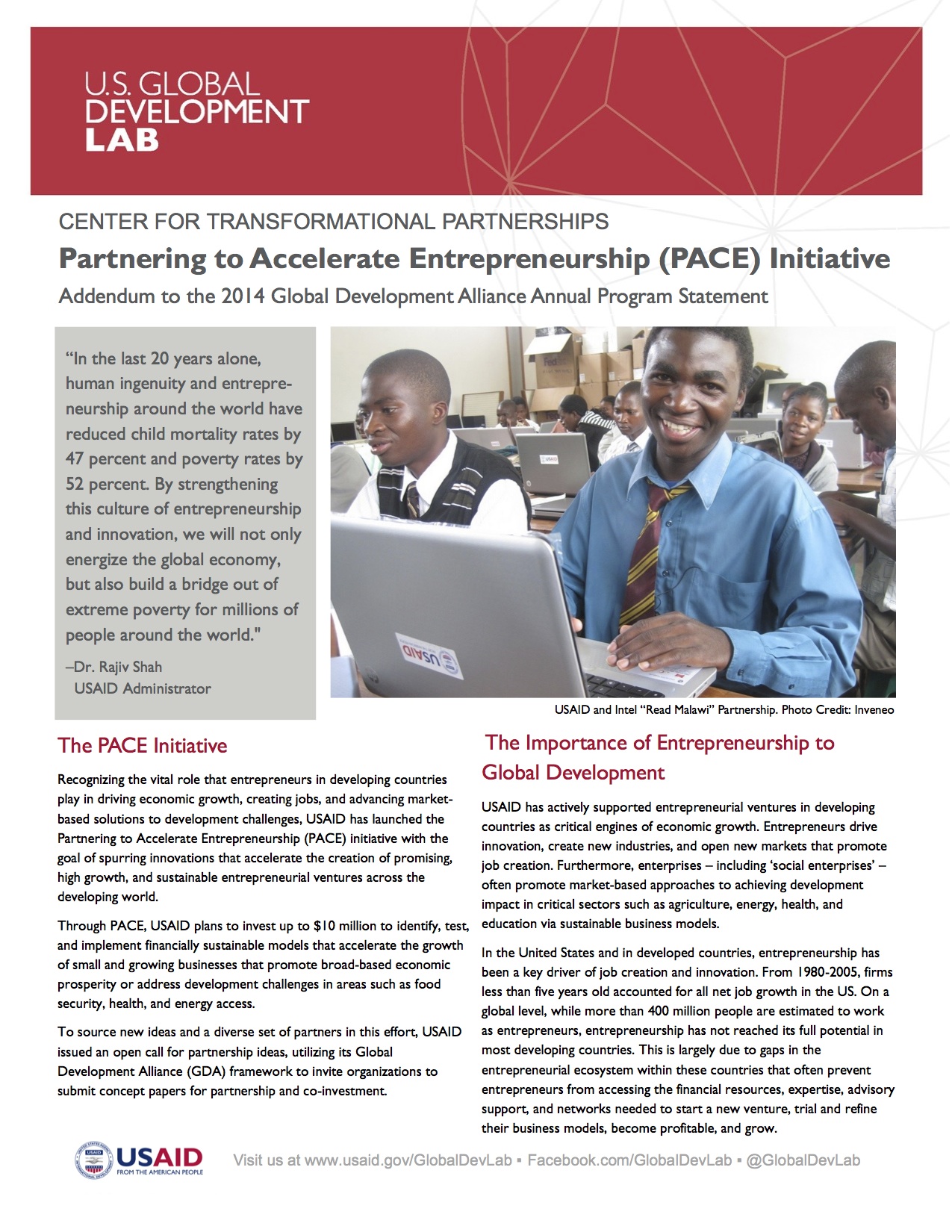Speeches Shim
Partnering to Accelerate Entrepreneurship (PACE) Initiative
Addendum to the 2014 Global Development Alliance Annual Program Statement
PACE Fact Sheet ![]() (pdf - 2)
(pdf - 2)
“In the last 20 years alone, human ingenuity and entrepreneurship around the world have reduced child mortality rates by 42 percent and poverty rates by 48 percent—lifting over 600 million people above the dollar-and-a-quarter poverty line.”–Dr. Rajiv Shah
USAID Administrator
The PACE Initiative
Recognizing the vital role that entrepreneurs in developing countries play in driving economic growth, creating jobs, and advancing market- based solutions to development challenges, USAID has launched the Partnering to Accelerate Entrepreneurship (PACE) initiative with the goal of spurring innovations that accelerate the creation of promising, high growth, and sustainable entrepreneurial ventures across the developing world.
Through PACE, USAID plans to invest up to $10 million to identify, test, and implement financially sustainable models that accelerate the growth of small and growing businesses that promote broad-based economic prosperity or address development challenges in areas such as food security, health, and energy access.
To source new ideas and a diverse set of partners in this effort, USAID issued an open call for partnership ideas, utilizing its Global Development Alliance (GDA) framework to invite organizations to submit concept papers for partnership and co-investment.
The Importance of Entrepreneurship to Global Development
USAID has actively supported entrepreneurial ventures in developing countries as critical engines of economic growth. Entrepreneurs drive innovation, create new industries, and open new markets that promote job creation. Furthermore, enterprises – including ‘social enterprises’ – often promote market-based approaches to achieving development impact in critical sectors such as agriculture, energy, health, and education via sustainable business models.
In the United States and in developed countries, entrepreneurship has been a key driver of job creation and innovation. From 1980-2005, firms less than five years old accounted for all net job growth in the US. On a global level, while more than 400 million people are estimated to work as entrepreneurs, entrepreneurship has not reached its full potential in most developing countries. This is largely due to gaps in the entrepreneurial ecosystem within these countries that often prevent entrepreneurs from accessing the financial resources, expertise, advisory support, and networks needed to start a new venture, trial and refine their business models, become profitable, and grow.
Bridging the Gap: The Challenge of Early Stage Incubation
While the level of maturity and dynamism of entrepreneurial ecosystems varies across the developing world, recent research points to a particular challenge that exists across many markets. Early stage enterprises cite a lack of access to finance as a key challenge; investors cite a lack of investment-ready enterprises. This “pioneer gap” prevents promising enterprises from receiving needed investment. In addition, this gap has also led to a concentration of funding from investors and donors into a limited selection of more mature enterprises with proven track records. As a result, less attention is paid to earlier stage enterprises that offer tremendous growth potential, but are perceived as higher risk investments.
A recent Monitor Deloitte study estimated that out of 400+ Africa- based enterprises, only 32 percent were commercially viable and had the potential to scale, with only 13 percent of the enterprises currently operating at scale. This is in contrast to a 2011 survey from J.P. Morgan, which found that the number of institutions and high net worth individuals familiar with impact investing had doubled since 2010. This increase in the number of interested donors and financiers, coupled with the lack of investable enterprises, highlights the need to support the entrepreneurial ecosystem and increase the number of enterprises that can eventually become self-sustaining.
PACE Objectives & Approach
The PACE initiative seeks to fund innovations that can help address this pioneer gap – thus unlocking the potential of thousands of promising enterprises – by fostering financially sustainable approaches to enterprise incubation and catalyzing private investment towards early-stage enterprises.
PACE focuses on forging partnerships and fostering innovations that:
- Stimulate the development of financially sustainable models that support the incubation of early-stage enterprises in developing countries;
- Identify, test, and evaluate blended investment models that enable private capital, venture philanthropy, and grant funds to simultaneously flow to early-stage enterprises; and
- Catalyze the development of entrepreneurial ecosystems in specific industries or geographies by addressing market failures and building elements of the market.
To achieve this, USAID will:
- Co-invest in partnerships that support innovative and sustainable models to accelerate the growth of developing world enterprises;
- Support a research and learning agenda focused on identifying best practices and models that have succeeded in accelerating entrepreneurship;
- Convene stakeholders and disseminate learnings from USAID’s investment portfolio; and
- Embed successful incubation and investment models into USAID programs within priority focus sectors such as food security, global health, and energy access.
Get Involved: Submit Your Ideas for Accelerating Entrepreneurship in Partnership with USAID
In November 2013, USAID issued an open call for entrepreneurship concept papers under the GDA Annual Program Statement (APS) and received over 100 concept papers from a wide variety of organizations. Subject to availability of funds, USAID intends to re- open this call for concept papers under the GDA APS later in 2014 and 2015.
USAID invites a broad range of partners – including investors, businesses, incubators and accelerators, foundations, universities and NGOs – to submit ideas for partnership and co-investment that address PACE objectives, meet the criteria of a GDA, and target one or more USAID presence countries. USAID intends to co-invest with other partners in a select number of programs, with likely funding levels for individual awards in the range of $500,000 to $5 million.


Comment
Make a general inquiry or suggest an improvement.